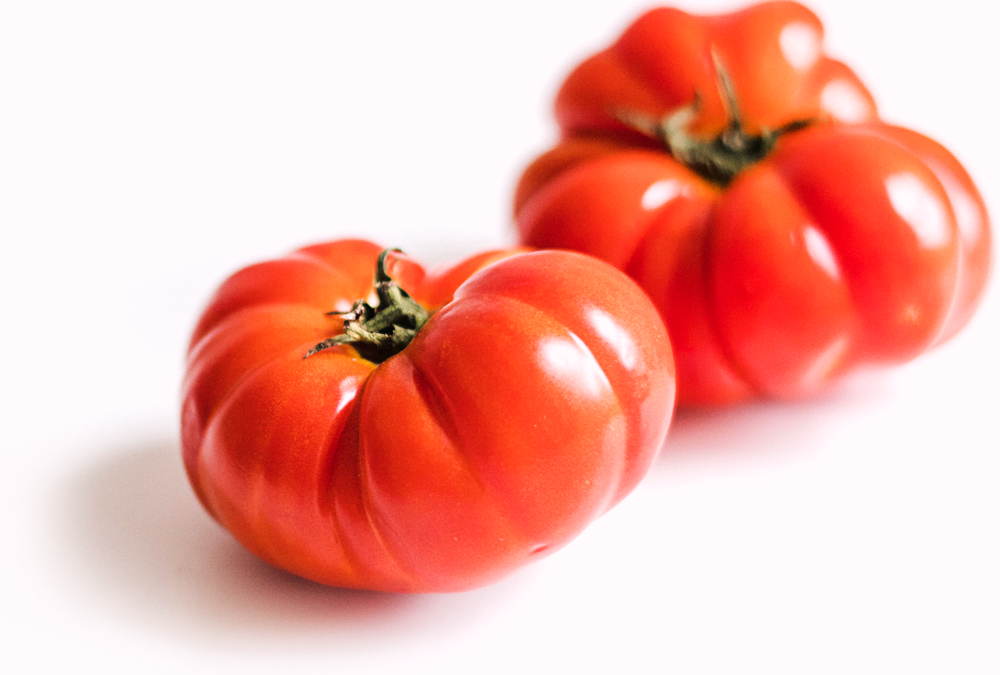We returned home from the beach to a bunch of ripe tomatoes in the garden!
There is nothing like a slice of ripe tomato on toast that has been grilled with coconut oil and sprinkled with Himalayan sea salt! A layer of avocado seals the deal – tomatoes and avocado pair nicely together.
“Tomatoes, the second most produced and consumed vegetable nationwide, are a rich source of lycopene, beta-carotene, folate, potassium, vitamin C, flavonoids, and vitamin E.” (5)
Tomatoes are an anti-inflammatory fruit and nightshade vegetable that contain lycopene, which is a powerful phytonutrient, specifically, an antioxidant which protects against oxidative stress. Lycopene has also been shown in studies to protect against damage due to the chemical DDVP, which is commonly used as a pesticide, AND to protect against the damage that MSG, which is commonly used in processed foods, does to the brain. In terms of cancer, lycopene is a strong force in the fight against cancer. Lycopene was shown to slow the growth of prostate and cancer cells in the body and to reduce tumor growth in those with renal cell carcinoma. (1,2,3,4,5)
Growing your own tomatoes guarantees the bioavailability of the nutrients that tomatoes have to offer. Their bright natural color make them stand out as a strong antioxidant and anti-inflammatory food. The antioxidants found in tomatoes help protect the heart against oxidative stress, reducing the risk of heart disease.
Sources
1 El-Saad, A. A., Ibrahim, M. M., Hazani, A. A., & El-Gaaly, G. A. (2016). Lycopene attenuates dichlorvos-induced oxidative damage and hepatotoxicity in rats. Human & experimental toxicology, 35(6), 654–665.
2 Sadek, K., Abouzed, T., & Nasr, S. (2016). Lycopene modulates cholinergic dysfunction, Bcl-2/Bax balance, and antioxidant enzymes gene transcripts in monosodium glutamate (E621) induced neurotoxicity in a rat model. Canadian journal of physiology and pharmacology, 94(4), 394–401. https://doi.org/10.1139/cjpp-2015-0388
3 Assar, E. A., Vidalle, M. C., Chopra, M., & Hafizi, S. (2016). Lycopene acts through inhibition of IκB kinase to suppress NF-κB signaling in human prostate and breast cancer cells. Tumour biology : the journal of the International Society for Oncodevelopmental Biology and Medicine, 37(7), 9375–9385. https://doi.org/10.1007/s13277-016-4798-3
4 Sahin, K., Cross, B., Sahin, N., Ciccone, K., Suleiman, S., Osunkoya, A. O., Master, V., Harris, W., Carthon, B., Mohammad, R., Bilir, B., Wertz, K., Moreno, C. S., Walker, C. L., & Kucuk, O. (2015). Lycopene in the prevention of renal cell cancer in the TSC2 mutant Eker rat model. Archives of biochemistry and biophysics, 572, 36–39. https://doi.org/10.1016/j.abb.2015.01.006
5 Willcox, J. K., Catignani, G. L., & Lazarus, S. (2003). Tomatoes and cardiovascular health. Critical reviews in food science and nutrition, 43(1), 1–18. https://doi.org/10.1080/10408690390826437

